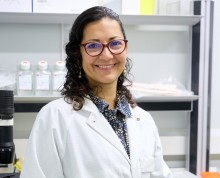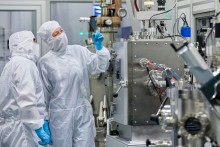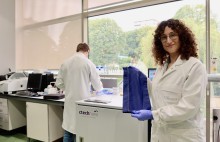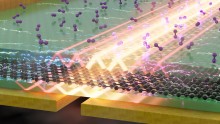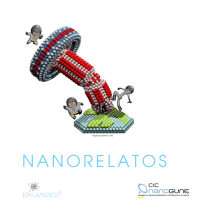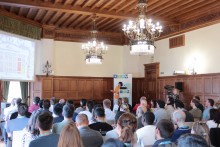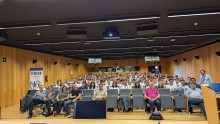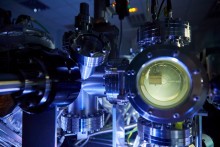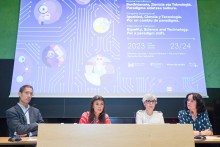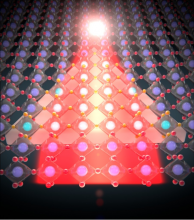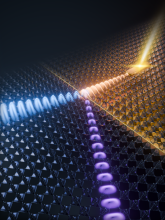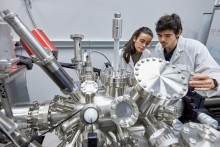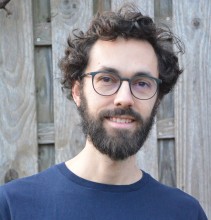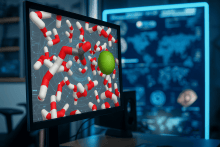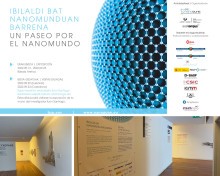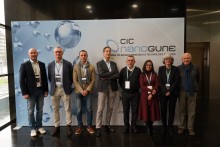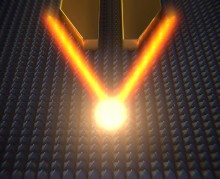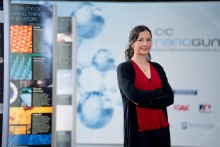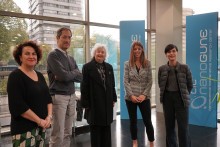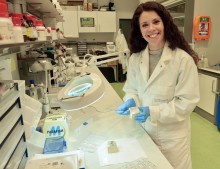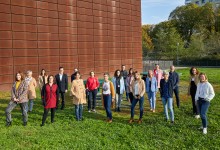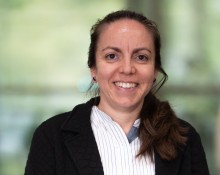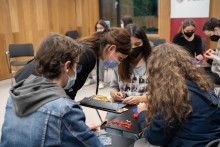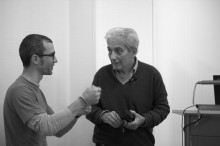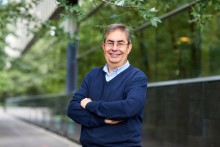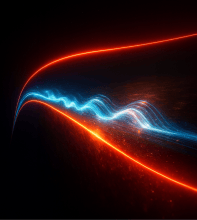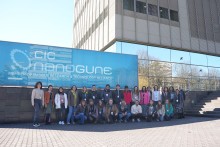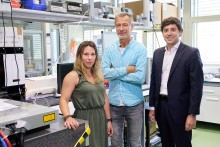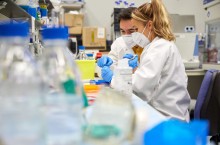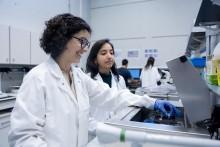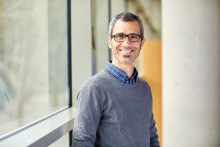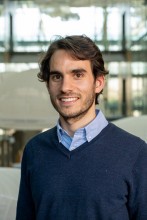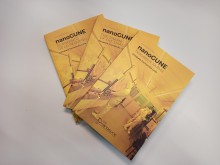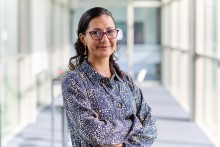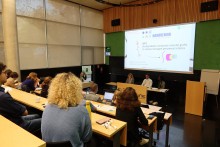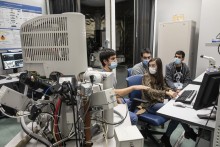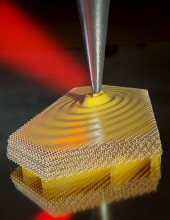Related news by tag nanoscience
New group to address gynecology and infertility healthcare challenges
Mariana Medina-Sánchez is a leading Colombian mechatronics engineer. After obtaining her PhD at the Catalan Institute of Nanoscience and Nanotechnology (ICN2) in Barcelona, she joined the Leibniz Institute Dresden (IFW Leibniz) in Germany and focused her career on the development of medical microrobots for assisted reproduction and localized release of therapies for the treatment of gynecological cancer.
II Global Graphene Call, business ideas linked to graphene
In the first call back in 2020, 35 projects were registered and the winning company was Dutch, which underlines the international nature of the call. These results have spurred the launch of this new call in 2022, now with the additional contribution of Fomento San Sebastián.
Technology developed at CIC nanoGUNE driving forward innovation in the textile industry
Innovation for the textile industry is not exclusively in design and fashion. The industry and the market are increasingly calling for innovative textiles that are adapted for the use for which they are designed. Over the last few decades, nanotechnology has developed various techniques to modify the properties of materials “à la carte”, which is why it is an indisputable ally in the development of new fibers that provide our garments with new properties, making them tougher, more waterproof, UV protective, antimicrobial, stain repellent, etc.
Nano-scale molecular detective: New on-chip device uses exotic light rays in 2D material to detect molecules
Molecules have some sort of fingerprints, unique features that can be used to differentiate them. Each type of molecule, when illuminated with the right light, vibrates at a characteristic frequency (its resonance frequency, which typically occurs at infrared frequencies) and strength. Similar to what can be done with human fingerprints, one can exploit this information to distinguish different types of molecules or gases from each other.
CIC nanoGUNE organizes Nano-Story Contest for the first time
This contest is geared towards students who are currently attending schools in the Basque Autonomous Community: young people residing in the Basque Autonomous Community, and young Basque speakers from anywhere in the world, all of whom were between 14 and 17 years of age on 31/12/2021. So the participants will be in one of the following education levels: the 3rd and 4th year of Compulsory Secondary Education (ESO), 11th or 12th grades (Sixth Form), Basic Vocational Training and Intermediate Voc
Teaching the world about cutting-edge tools for nanoscale optical imaging
s-SNOM and nano-FTIR are unique optical imaging and spectroscopy tools that enable nanoscale imaging and spectroscopy in a broad spectral range, between visible and terahertz frequencies. Rainer Hillenbrand was one of the researchers involved in the development of these techniques and their commercialization, opening a completely new field of experimental research of optical phenomena and materials properties at the nanoscale.
The future of physics visits Donostia
During the event, over 170 students from across Spain will be gaining first-hand knowledge about the work being carried out at these four centres in their respective fields within the Basque scientific ecosystem; they will be sharing impressions with the research staff at each centre and discovering professional and training opportunities in one of the most active scientific hubs in the country. The programme for the day in Donostia will also include a round table discussio
CIC nanoGUNE expands its patent portfolio
The diversity of application fields demonstrates the great versatility of nanoscience research, and the increase in licensed methods and technologies demonstrates its ability to improve and add value to industrial processes and products. "Our goal is to continue doing research of excellence and transferring those specific developments with the potential to improve the competitiveness of companies to the economic sector," explained Ainara Garcia-Gallastegui, head of Technology Transfer at nanoGUNE.
Presentation of the International Congress "Equality, science and technology. For a paradigm shift."
The Minister stressed that the gender gap in the field of science and technology is not just about the reduced presence and visibility of women in this field alone, but also about the conception of it that is still androcentric; she added that a paradigm shift is therefore required to ensure that equality is incorporated in a systemic way. “It is also about analyzing how science and technology can contribute to the equality of women and men,” she pointed out.
Understanding nanolight refraction on highly anisotropic materials
Light refraction accounts for the change of direction and speed that a wave undergoes when passing from one medium to another. Glasses and contact lenses, microscopes and telescopes, or something as commonplace as the fact that a pencil inserted into a glass of water appears bent when viewed from the outside, have their origin in the optical phenomenon of refraction.
Two-step excitation unlocks and steers exotic nanolight
An international team of researchers, including researchers from the NanoOptics group at CIC nanoGUNE, has developed a novel technique to efficiently excite and control highly-confined light-matter waves, known as higher-order hyperbolic phonon polaritons (HPhPs). Their method not only sets new records for the quality and propagation distance of these waves but also uses a sharp boundary to create a form of pseudo-birefringence, sorting and steering the waves by mode into different directions.
CIC nanoGUNE opens a new call for Master students
The Basque Nanoscience Research Center, nanoGUNE, located in Donostia – San Sebastian (Basque Country, Spain), offers four scholarships to do a research project within one of its 10 research groups, including a rigorous scientific training, a close supervision, access to regular scientific seminars and colloquia, as well as access to suitable laboratory facilities.
Niklas Friedrich gets GEFES 2023 Award for best experimental thesis
Molecular spintronics is a technology that aims to use the electron spin of organic molecules as the basic unit of information. This thesis studies electronic transport through graphene nanoribbons (GNRs) and demonstrates electronic access to spin states created by special units embedded in GNRs.
Review: Nanoscale terahertz scanning probe microscopy
Terahertz radiation has become an important diagnostic tool in the development of new technologies. However, the diffraction limit prevents terahertz radiation (λ ≈ 0.01–3 mm) from being focused to the nanometer length scale of modern devices. In response to this challenge, terahertz scanning probe microscopy techniques based on coupling terahertz radiation to subwavelength probes such as sharp tips have been developed.
AI helps decode how nature builds minerals
The study focuses on calcium carbonate, a mineral found in seashells, corals, and geological formations. It also plays a pivotal role in capturing atmospheric CO2. While molecular simulations have long been used to study its formation, previous models lacked the precision to capture subtle but critical reactions, such as proton transfer, a fundamental step in crystallization.
The exhibition A Walk through the Nanoworld comes to Bilbao
The exhibition, organized as part of the Bizkaia Zientzia Plaza initiative, brings together authors, works and tools of nanoscience and nanotechnology. The public will be able to contemplate images of different nano-objects captured by amazing instruments, such as the atomic force microscope and the electron microscope, among others, which have become the "eyes of the nanoworld"; they will be able to see some of the tools used in this field, as well as real products and objects from day-to-day research.
A nanofabrication instrument installed at nanoGUNE enhances the Basque electron microscopy infrastructure
The CRYO Plasma FIB is a unique advanced nanofabrication and electron microscopy instrument, one of the few in Europe; it will be supporting research centers and industry in the Basque Country and around the world in fields such as materials science relating to low temperature physics, lithium-ion batteries for the energy sector, and cryogenic electron cell tomography.
Researchers develop an innovative strategy to focus infrared light into the nanoscale
Focusing of light into the nanoscale represents a landmark for the implementation of nanotechnology in optics and biochemistry. Based on the exotic propagation of light in highly anisotropic materials (where light propagates in the form of rays along specific directions), a research team led by the University of Oviedo has demonstrated the focusing of infrared light into extraordinarily small regions.
"NANOTECHNOLOGY PROMISES SIGNIFICANT ADVANCES IN MEDICINE"
How have the fields of gynecology and infertility evolved in recent years, and where are we now?
CIC nanoGUNE and BIC Gipuzkoa strengthen ties to increase the social and economic impact of nanotechnology
The main aim of the work by BIC Gipuzkoa is to seek out and set up science and technology-based projects and enterprises in Gipuzkoa. So, “it is essential to nudge or drive forward technologies that are being developed at centers such as nanoGUNE to give them the final impetus they need to achieve this goal”, as Marisa Arriola, managing director of BIC Gipuzkoa pointed out.
Developing nanomaterials to conserve cultural heritage
Developing protective coatings for cultural heritage conservation and for the building industry poses a key challenge. These coatings not only have to be resistant and durable, but also compatible and tough in the face of adverse environmental factors such as humidity, thermal variation and atmospheric contamination.
Emakumeak Zientzian goes on adding to itself
The collaboration agreement for the project, which is expanding year on year, was signed this morning. The 17 organizations signing up to the agreement on the 6th edition of Emakumeak Zientzian are a significant representative sample of the Basque Country’s science and technology network. This coming together is the result of an open-door initiative always aspiring to unite and convinced that we are better off by adding.
Beatriz Martín García receives one of the 2025 Journal of Materials Chemistry Lectureship runner-up awards
The Journal of Materials Chemistry, a prestigious publication of the Royal Society of Chemistry (RSC), established in 2016 an annual lectureship together with two runners-up awards, which intend to recognize the achievements of early-career scientists and acknowledges their significant contributions to the field of materials chemistry.
Women at the forefront of science and technology
The 24 signatory entities of the agreement for the joint organization of the 7th edition of Emakumeak Zientzian are an important representative sample of the fabric of science and technology in the Basque Country: the Center for Materials Physics (CFM CSIC-UPV/EHU), Achucarro Basque Center for Neuroscience, CIC biomaGUNE, CIC nanoGUNE, University of Deusto, POLYMAT, Basque Center for Climate Change (BC3), Basque Center for Applied Mathematics (BCAM), Basque Center on Cognition, Brain and Language (BCBL), Biodonostia, Ceit, Cidetec, Donostia International Physics Center (DIPC), Elhuyar,
Electrical control of magnetism by electric field and current-induced torques
Albert Fert, French physicist and winner of the Nobel Prize in Physics in 2007, is one of the discoverers of giant magnetoresistance, a physical effect that revolutionised hard disk technology, allowing a huge increase in its capacity. His research enabled the capacity and applications of the hard disk drive to be increased, and he is now working towards a new generation of microprocessors t
Emilio Artacho APS Fellowship in 2021
The quantum simulation method and program developed by Artacho and others, known by its acronym SIESTA, is open and free for the research community.
Researchers Observe Flat-Band Ultrastrong Coupling
Strong and ultrastrong coupling arise when the exchange of energy between light and matter becomes so large that the two no longer behave independently, instead forming hybrid modes—called polaritons—that combine the characteristics of both. In this work, the researchers entered the ultrastrong coupling regime by tuning surface plasmons—collective electron oscillations—in a semiconductor substrate so that their resonance frequency matches that of the optical lattice vibrations (phonons) of a thin polar crystal layer placed on top.
Winter School, getting to know and experiencing everyday life at CIC nanoGUNE
The Winter School 2023 is geared primarily towards undergraduate students of physics, chemistry, biology and engineering who are considering the possibility of continuing their education by doing a PhD thesis. The winter school comprises a combination of academic lectures, cross-skills training sessions and laboratory practice in the center's various laboratories.
CIC nanoGUNE launches new spin-off with technology for safer childbirth
This disruptive technology arose out of a need identified in daily clinical practice by medical professionals in Osakidetza (the Basque Health System) and who are linked to its Health Research Institute, IIS Biogipuzkoa; it led to collaboration with nanoGUNE and seeks to achieve a solution to improve the monitoring of babies' vital signs –including perinatal asphyxia or lack of oxygen– during childbirth.
NanoGUNE opens the registration period for the summer internship program
In the framework of this program, the Basque nanoscience research center will be receiving this summer at least ten new students in their 3rd and 4th years of Physics, Chemistry, Biology, and Engineering. For a period of two months, undergraduates will be collaborating with nanoGUNE researchers in their research projects in the areas of nanoscale optics, nanobioengineering, electronic phenomena and magnetism, and nanoscale materials.
Quantum nanoscience, nanomaterials, and nanomedicine feature in CIC nanoGUNE´s summer internship program
In the framework of this program, the Basque nanoscience research center will be receiving this summer at least ten new students in their 3rd and 4th years of Physics, Chemistry, Biology, and Engineering. For a period of two months, undergraduates will be collaborating with nanoGUNE researchers in their research projects in the fields of quantum nanoscience, nanomaterials and nanomedicine.
Fèlix Casanova receives the Intel Outstanding Researcher Award for the second time
Finding a replacement for today’s electronic technology to make it smaller, faster and, most importantly, more energy-efficient, i.e. so that it consumes less, is a global challenge. In recent years, Fèlix Casanova and his nanoGUNE team have been working in collaboration with the multinational Intel on a research project aimed at improving the performance and energy savings of future computers by optimizing MESO technology.
Connection between the Nobel Prize in Physics and San Sebastian
This year's two Nobel Laureates in Physics relied on tools from physics itself to develop methods that form the basis of automatic machine learning. These methods are widely used by the scientific community and have made significant advances in a very broad range of fields possible. The breadth of the fields in which it has been possible to apply these methods is particularly noteworthy. What is more, they have enabled studies and simulations that would have been unthinkable just three or four years ago to be conducted.
NanoGUNE, the big challenge of the small, also in Spanish and English
The book sets out to explain to the general public how cutting-edge research is conducted in the field of nanoscience and nanotechnology. How does “the big challenge of the small” materialize on a day-to-day basis? How can a truly innovative, daring project come to fruition? The story, written in a lively style by the journalist Elixabete Garmendia, answers this question which can now be read in Basque, Spanish and English.
Mariana Medina-Sánchez: “The sinergy of microrobotics, nanobiosensors and AI is transforming assisted reproduction treatments and gynecological healthcare”
Reproductive medicine is undergoing a veritable technological revolution.
NanoReMedi, an innovative research project on regenerative medicine
Repair or replacement of tissue and organ functions, lost due to age, disease or damage, represents one of the most urgent medical needs of our aging society. The NanoReMedi consortium will contribute to addressing this fundamentally important issue by using a new and efficient scientific approach, relying on the design, preparation, characterization and validation of peptide-based functional nanomaterials.
A Galician delegation visits CIC nanoGUNE
The meetings and visits, which began on Monday, have enabled both delegations to exchange experiences on the research ecosystem, the organisational and scientific management of these centres and to identify good practices and inspiring initiatives, as well as to find opportunities for networking.
New edition of the CIC nanoGUNE Winter School
The Winter School 2022 is geared primarily towards undergraduate students of physics, chemistry, biology and engineering who are considering the possibility of continuing their education by doing a PhD thesis. The winter school includes a combination of academic lectures, cross-skills training sessions and laboratory practice in the center's various laboratories.
Researchers observe extremely squeezed directional THz waves in thin semiconductor crystals
Polaritons are hybrid states of light and matter that arise from the coupling of light with matter excitations. Plasmon and phonon polaritons are among the most prominent examples, formed by the coupling of light to collective electron oscillations and crystal lattice vibrations, respectively. They play a crucial role in various applications, from sub-diffraction optical spectroscopy and ultrasensitive chemical sensors to ultracompact modulators for communication applications.

